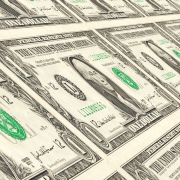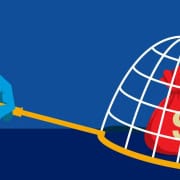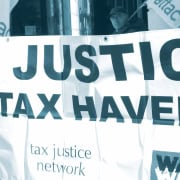|
Getting your Trinity Audio player ready...
|
By Janine Erasmus – CW Voices
In part one of our latest mini-series, we posed the question: who are the real corrupt countries in today’s globalised context?
We considered factors such as beneficial ownership transparency, the implementation of the African Union Anti-Corruption Convention, and pan-African collaboration in anti-corruption research. The usual suspects such as Nigeria were shown to be progressive in committing to and implementing anti-corruption legislation such as that which enhances beneficial ownership transparency. In fact, anti-corruption progress across the continent is gaining ground, especially as a result of the work of advocacy organisations such as Corruption Watch, according to Transparency International.
Now we delve into the doings of countries that top other corruption indices – the Tax Justice Network’s (TJN) Financial Secrecy Index and Corporate Tax Haven Index, and The State of Tax Justice report.
These highlight the other side of the coin of corruption – the countries which knowingly enable secrecy, illicit movement of funds, tax evasion, and opacity in corporate ownership structures.
Turning the tables
The TJN’s biennial Financial Secrecy Index (FSI) assesses countries’ financial and legal systems according to their level of opacity and how much financial secrecy they supply to the world – in other words, the jurisdictions most willing and suited to helping crooked individuals hide or launder their money, and evade paying taxes.
The interesting thing about this index is that the tables have turned in comparison to the corruption indices mentioned above, and it is developed countries who top the list of jurisdictions offering secrecy to the rich and corrupt. A higher rank on the FSI means that the country plays a bigger role in providing channels for illegal movement of money – so while the country may not be directly involved in the corruption, it is knowingly complicit in enabling it.
On the 2022 edition of this index (not much changed from previous years), the US is the world’s most secretive jurisdiction in this regard, followed by Switzerland, Singapore, Hong Kong, and Luxembourg.
The UK and four of its many overseas territories occupy 25% of the top 20 positions. This means that they enable wealthy individuals and criminals to hide and launder money extracted from around the world.
The shock release in 2016 of the International Consortium of Investigative Journalists’ Panama Papers showed just how extensive the secretive network is. “A giant leak of more than 11.5-million financial and legal records exposes a system that enables crime, corruption, and wrongdoing, hidden by secretive offshore companies.”
Similar exposés including the Russian Laundromat (2014), the FinCEN Files (2020), and Dubai Uncovered (2020) laid bare the channels used by the wealthy when they need to hide a few million dollars away from the eyes of authorities. Money flowed through British territories, the US, and Central Asia, among others, with the help of Implicated parties such as global banks and real estate companies.
Tax havens a conduit for large-scale financial theft
Speaking at a webinar in 2022 titled Ending lawless wealth: towards a global asset registry, Njoki Njehu, pan-African regional coordinator of the Fight Inequality Alliance, said: “Whether you’re talking about debt or talking about illicit financial flows, the conversation is that in the Global South, governments and government officials are corrupt, and therefore that’s where the problem lies.”
However, she added, the tax havens are not in the Global South. “Even when we have our own government officials spiriting away the resources and the wealth of our country, it is not kept in our countries. It goes to the north.”
Another bi-yearly TJN index, the Corporate Tax Haven Index, is a ranking of jurisdictions most complicit in helping multinational corporations avoid or lessen the amount of corporate income tax due by them. A higher ranking means that the jurisdiction’s laws and its position in the global economy combine to create a greater risk of corporate tax abuse by multinationals – thereby contributing to illicit financial flows and the siphoning of tax revenue that should be meant for social and economic development.
The effect of tax abuse, says TJN, is not only to “strip away funding for desperately needed public services. It also undermines smaller local businesses, forcing them to compete on an unlevel playing field against larger rivals paying unfairly low taxes … It results in society being scarred by needlessly deep, overlapping inequalities for women, racialised groups and disabled people especially.”
Here too, the UK is highly complicit – three of its overseas territories hold the top three positions. Another five British overseas territories or Commonwealth territories are scattered further throughout the top 20. Others in the top 20 include Luxembourg, Switzerland, Singapore, Hong Kong, the United Arab Emirates, Ireland, France, Belgium, Netherlands, Cyprus, China, and the UK itself. These are all wealthy countries, and it is not too much of a leap to deduce that their shady financial mechanisms help them become wealthier.
Lower income countries are hardest hit by global tax abuse. It is not surprising to find four of the usual suspects causing most of the damage – the UK, the Netherlands, Luxembourg, and Switzerland.
TJN issues another annual publication titled The State of Tax Justice, in which it reports on how much each country in the world loses in tax each year to cross-border corporate tax abuse by multinationals and private tax evasion by individuals. Its 2021 edition revealed that countries lose around $483-billion in tax a year to global tax abuse committed by multinational corporations and wealthy individuals.
The tax haven index quantifies the role each country plays by using data based on corporate activity to provide a direct measure of the scale of abuse through and affecting each jurisdiction. It reveals that over two-thirds of global corporate tax abuse risks are enabled by OECD members, who have effectively developed the rules regarding international tax for six decades. These particular countries, says TJN, are responsible for 78.3% of that $483-billion tax loss – costing countries over US$378-billion in lost tax every year.
Countries topping the TJN indices cannot claim ignorance of the goings-on within their borders. The TJN’s indices, for example, have been published for several years – the Financial Secrecy Index has been around since 2009.
Conclusion
Tax abuse, illicit financial flows, and money laundering all have their roots in corruption. With extensive corruption at various levels along the way, none of these activities would be possible.
In terms of Cameron’s statement, it would seem, therefore, that this is a case of the physician needing to heal himself before trying to heal others. There is corruption on both sides of the spectrum, and certainly countries like the UK which oversee a global network of financial secrecy and abuse should look to their own affairs at the very same time that they comment about others.
The conclusion is not that countries like Nigeria are not corrupt, but that countries like the UK are not innocent. It is ironic indeed that it and its overseas territories stand high on the list of those that knowingly handle, and facilitate the disposal of, massive amounts of questionable money sourced from abroad and funnelled into the global money laundering system.
African countries, meanwhile, are working hard to mitigate or undo the damage caused by secretive overseas jurisdictions that enable the looting of the continent’s natural and financial resources.
The TJN went as far as writing a letter in April 2023 to King Charles III, saying that the UK is standing in the way of progress internationally and asking him to “provide a powerful impetus for good” in helping to dismantle the long-standing tax haven structure.
“These tax havens continue to disadvantage their own inhabitants as well as some of the poorest people globally – and of course the people of the UK. We hope this [coronation] can mark a pivotal moment to address the heavy financial and human costs borne by ordinary people in the UK, the Commonwealth, and around the world, due to the UK and its network of tax havens over which Your Majesty is Sovereign.”
To this day there does not seem to be a response from the palace.








